
views
Reacting to Verbal Attacks

Remain calm. The whole point of a verbal bully’s attacks is to unsettle you, so don’t give them the satisfaction. Stay calm, cool and collected despite any taunts or insults. To do this, it may help to breathe deeply, count silently, or mentally repeat an affirmation, such as “I will remain calm.”
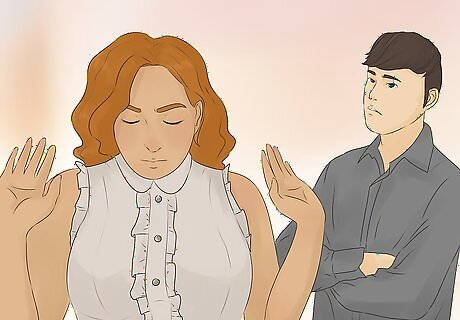
Dismiss the person’s attack. Ignoring the person is an option. An even more powerful response, however, is to make it clear to the person that the remark doesn’t bother you. Make eye contact with the person, then shake your head in dismissal and look away.

Agree with them, if it's true. Most verbal bullying is carried out because the person hopes to offend you. If you can see any truth to their comment, throw the attacker off balance by agreeing with them. When you accept the statement, it loses its power and the attacker loses relevance. For example, someone says “You’re fat,” you might say “You’re right. I am fat."
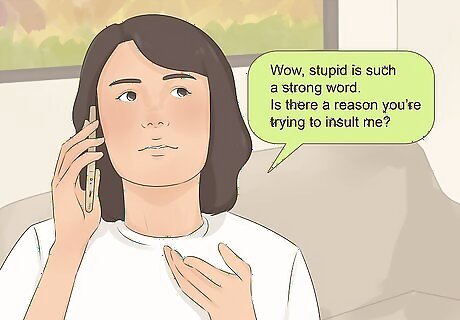
Dismantle the attack. Avoid becoming defensive with the person. Instead, put the attacker in the hot seat by pulling apart their remark. Analyze the remark and ask questions about it. For example, someone says, “You’re stupid.” You might respond with “Wow, stupid is such a strong word. Is there a reason you’re trying to insult me?” However, if the bullying behavior is out of control or you feel unsafe, do not have any contact with the attacker. Just walk away.
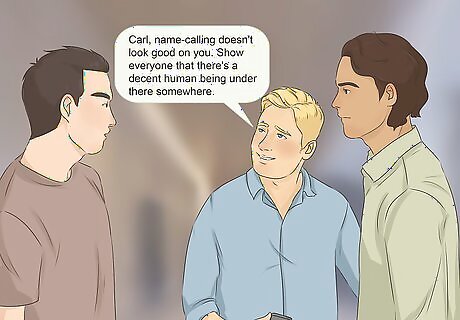
Play the kind parent. If you witness someone else being verbally attacked, help defend them by bringing the attacker's common decency into question. In response to their "bad parent" role, play the role of the overly kind parent. For instance, if the attacker calls your friend a name, you might say, "Carl, name-calling doesn't look good on you. Show everyone that there's a decent human being under there somewhere." They'll likely feel shamed by their behavior and apologize.
Taking Appropriate Action

Leave if you feel unsafe. If verbal bullying makes you feel physically in danger, don’t try to engage with the person any further. Leave the environment right away and go to a public place with others.

Tell someone in authority. If you are a student, tell a teacher, coach, or school counselor. If verbal bullying happens at your workplace, talk to a supervisor or human resources administrator. The point is to tell someone in a position of authority, who can stop the bullying. If the first person you tell about verbal bullying does not take action, keep telling someone until something changes.
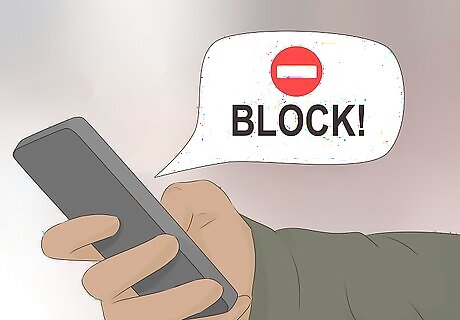
Terminate your relationship with the attacker. Sometimes those who attack you verbally are supposedly people who care about you. Friends or family members may insult you or make subtle remarks that hurt your feelings. When this happens, get distance from the person. If at all possible, end the relationship and avoid the person completely. If you are unable to completely cut the person from your life, take measures to limit your contact with them. Also, avoid being alone with them whenever possible.
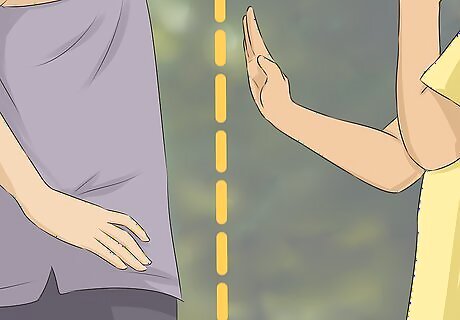
Draw a boundary. Just because someone bullies you, you don’t have to play the role of “victim.” Stand up for yourself and let the person know that you will not accept verbal bullying. Do this by enforcing your personal boundaries. For instance, tell the person, “I refuse to be insulted. If you cannot talk to me respectfully, do not talk to me at all.” You might also say, “I will not accept verbal attacks. If you continue, I will leave.” You may also want to add, "You are wasting your time because I know that only weak people bully."
Addressing Your Emotional Needs

Identify your strengths. Verbal bullying can make you doubt yourself. The best way to overcome self-doubt and improve your confidence is by recognizing your personal strengths. You can do this by thinking of the traits and skills at which you excel. If you have trouble identifying your strengths, ask a friend. Write out your strengths on a sheet of paper. At the start of each day, read them aloud and place “I am…” in front of each strength. For instance, you might say, “I am an excellent guitarist” or “I am kind to others.” Recite your list daily.

Surround yourself with supportive people. Counteract the negative effects of verbal bullying by spending time with the right people. Choose to surround yourself with positive and supportive individuals who value what you bring to the table. Reduce the time you spend with negative, toxic people who criticize you or influence you to engage in unhealthy habits.

Forgive the attacker. One way to counteract the effects of verbal bullying is by practicing compassion. This may be hard to do to someone who says mean things about you. But don’t view it as something you are doing for them—do it for yourself. Holding on to resentment and anger will only make you suffer. Instead choose to let those feelings go and forgive the bully. Write them a letter describing the bullying and how it made you feel. Express everything that you would like to say to the person. Read the letter aloud. Afterwards, says “Despite all this, I forgive you.” Then, destroy the letter and all the negative feelings associated with it.




















Comments
0 comment